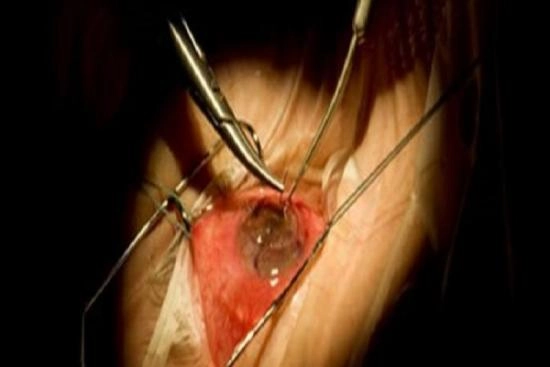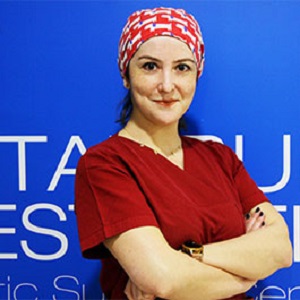To restore an individual's attractive appearance after losing one of his eyes for various reasons, an ocular Implant is used by specialist doctors to restore this deformity.
Ocular Implant in Turkey has demonstrated remarkable progress in ophthalmology research in recent years. Therefore, Turquie santé provides you with the best clinics and surgeons in Istanbul, Turkey.
We're Here to Help.

The eye implant is intended for people who suffer from:
- Visual abnormalities
- Myopia
- Hyperopia
- Eye infection
- Increased pressure inside the eyeball (glaucoma)
- bleeding
- Retinal problems, such as retinal detachment or swelling
- Cataract
- Presbyopia surgery
- The intervention lasts less than fifteen minutes
- Both eyes are operated on at least 1 week apart
- Vision improves and it usually recovers within a few days.
- Treatment in the form of eye drops should be followed for several days
- Annual monitoring is necessary.
Eye implant: what is it?
Also known as an additive implant, the eye implant is a synthetic lens that is placed inside the eye to improve visual defects or to crowd out an altered lens (cataracts). The surgery is performed without hospitalization, on an outpatient basis. Indeed, the surgeon inserts a small incision at the level of the cornea and passes the ocular implant in front of or behind the iris. Usually, both eyes are operated on a week apart. The eye implant can also be put on after removal of the lens, the lens of the eye.
This is also the case for examining a cataract. When placed, the eye implant is completely painless and transparent.
Who is the treatment for?
Eye implants are generally indicated for people who suffer from serious visual abnormalities, such as myopia or farsightedness. Indeed, astigmatism and cataracts are particularly evidenced with the installation of implants.
Implants are for eyes that have contraindications to PRK or Lasik intervention.
It should be noted, however, that this solution is also effective in presbyopia, as it is possible to introduce a progressive or multifocal implant that helps improve the gaze from near and far. (Like progressive lenses.)
The different types of ocular implants procedure
There are several types of eye implants that correspond to each case:
Inner chamber implants (clipped implants): they are anchored to the iris (the coloured area of the eye),they are used to correct large myopia (-10 to -20 diopters).
- Posterior chamber implants: they are placed in front of the lens, however, these implants are less used because they increase the expiration of the lens.
- Progressive implants (multifocal): they are used to correct cataracts or presbyopia
The risks and complications of an eye implant
The eye implant procedure is relatively safe. However, it still carries a low risk of serious complications such as:
- Eye infection
- Increased pressure inside the eyeball (glaucoma)
- Problems caused by the sutures used to fix the donor's cornea
- bleeding
- Retinal problems, such as retinal detachment or swelling
How to prepare for eye surgery?
Before performing the eye implant, you will go through the following steps:
- Complete eye exam. It is an examination by which the ophthalmologist determines diseases that can lead to complications after surgery.
- Evaluate your eye measurements. The ophthalmologist identifies the required size of the donated cornea.
- A review of all the medications and supplements you are taking. You may need to stop taking certain medications or nutritional supplements before or after your eye implant.
- Treat other eye problems. Eye problems unrelated to the transplant, such as infection or inflammation, can limit the chances of a successful eye implant. An ophthalmologist will treat these problems before surgery.
The course of the ocular implant procedure
Depending on the deficit, measure the precise curvature of the eye, and manufacture the lens whose material will be chosen according to each individual's particular case and according to the deficit. In fact, the power of the lens is specified at least 4 days before the operation. In the meantime, you will have an anaesthesia consultation and order the usual blood tests before each procedure. Also, the eye implant procedure does not require hospitalization. Thus, the anaesthesia is local, it is carried out through simple anaesthetic eye drops in the eye. The operation is performed in a sterile operating room using a microscope. A small incision will be made in the eye and the lens will be inserted in the determining part.
Operative suites of eye surgery
In the majority of cases, there are no painful consequences after the operation. The vision may be a bit blurry for a few days, then you will regain clear vision with the deficit corrected. Eye drops should be put in place and use protective shells to sleep.
You see the surgeon the day after the operation, then after a week to monitor and remove any stitches.
Best clinics: prices Turkey
The prices of eye implants generally corresponds to the type of implants you are going to have. Turquie Santé puts at your service the Dunyagoz ophthalmology clinic in Istanbul which is a reference in its field, and experienced surgeons.
Share this page









